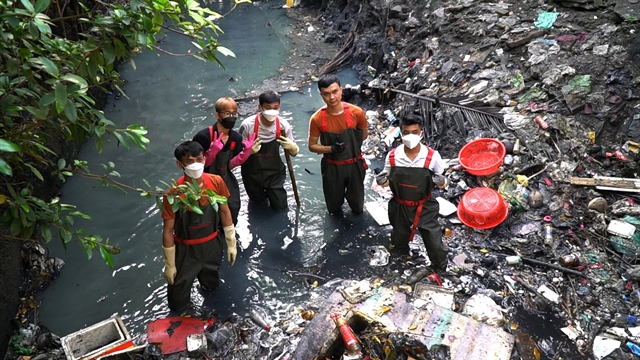 Environment
Environment


|
| A technical workshop held on September 20 seeking sustainable solutions for waste collection on rivers and canals in HCM City. — VNS Photo Nguyễn Diệp |
HCM CITY — HCM City’s waste collection on rivers, canals, and ditches mainly depends on manual labour, and needs to be replaced with technology to improve collection efficiency.
The city’s Department of Natural Resources and Environment and the United Nations Development Programme (UNDP) on September 20 co-organised a technical workshop on promoting sustainable solutions for waste collection on rivers and canals.
Bùi Hòa An, deputy director of the city’s Department of Transport, said the city has 101 rivers and canals that are utilised for water transportation, spanning around 912km collectively.
In recent years, the city focused on investing in upgrading, renovating and maintaining the waterway system to ensure smooth traffic.
It recently prioritised improving, refurbishing, and upkeeping the waterway system to guarantee efficient transportation.
“However, the environment has been contaminated by waste, water hyacinth, and vegetation, leading to water flow blockages that impact traffic, passenger transportation, and water tourism,” he said.
According to An the municipal People's Committee has addressed this issue by assigning the city’s Department of Transport to manage the removal of garbage, water hyacinth, and weeds from five waterways since 2019, employing manual collection techniques and crane equipment introduced in 2013.
To promote environmental sanitation in rivers, canals, and ditches, the department advises the municipal People's Committee to establish a framework of standards and unit pricing to facilitate comprehensive waste collection in these areas.
“It is essential to develop policies that encourage the adoption of modern and advanced technologies,” An said.
In the short term, efforts should concentrate on high-density urban routes and inter-provincial roads that experience significant waste accumulation, he said.
There should be coordinated efforts among various departments, responsible agencies, districts, and towns to ensure effective garbage collection from drainage systems and waterways, he said.
Hồ Kiên Trung, deputy head of the Pollution Control Department under the Ministry of Natural Resources and Environment, said the country currently produced nearly 68,000 tonnes of domestic waste daily, with about 88 per cent being collected and treated, leaving 12 per cent unaddressed.
“This is the source of trash that contaminates the environment, posing a risk of dissemination into rivers, canals, and ditches,” he said.
"Effective resolution of this issue necessitates stringent oversight by local authorities and collaboration with related partners."

|
| Members of the trash-collecting team Sài Gòn Xanh (Green Sài Gòn) are seen cleaning up a trash-choked section of Hy Vọng Canal in HCM City’s Tân Bình District. — VNS Photo Nguyễn Diệp |
UNDP Deputy Resident Representative in Việt Nam Patrick Haverman said that by collecting debris in rivers, plastic waste would be directly prevented from entering the sea from the mainland.
“Advancing innovation and garbage collection technology in waterways is crucial, and optimising waste management in the city would substantially aid in mitigating plastic waste pollution in the environment,” he said.
UNDP wished to continue to cooperate with the city in solid waste management projects, especially waste sorting at source and building material recovery facilities, he said.
Bùi Xuân Cường, vice chairman of the municipal People's Committee, highly valued the opinions of experts, scientists, representatives of departments, localities, organisations and businesses that had been voicing their useful proposals to gradually reduce ocean plastic pollution, starting with sustainable solutions for waste on rivers and canals to improve the environment and the quality of life.
“The city is currently striving to achieve the goals of improving the environmental quality of rivers, canals and ditches; and controlling waste sources, including the collection and treatment of wastewater and urban waste,” he said.
The city has adopted preventative measures against indiscriminate discharge, and maintains regular collection and treatment of waste on rivers, canals, and ditches.
It has also focused on implementing solutions to minimise waste generation from the source, to gradually standardise and improve the efficiency of waste collection, transportation, and treatment in the city, to ensure that all household waste in the city is collected and treated according to present regulations. — VNS




